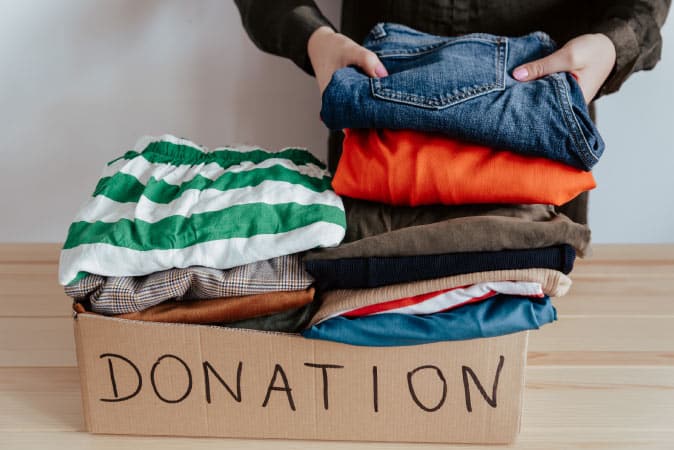
9 Packing Tips for Moving: Expert Advice From Influencers and Industry Pros
Packing Tips and Hacks
You’ve sold your home, are moving into a new one, and time isn’t exactly on your side. You need expert packing tips for moving. And you’ve come to the right place.
Figuring out how to pack for a move can be challenging to do alone. But don’t stress. We have easy packing tips for moving in a hurry that will help you fill those boxes like a world-class Tetris champion. Here are some of our favorite packing tips for moving, courtesy of some top influencers and industry experts.
Declutter, declutter, declutter
Whether you’re looking for easy packing tips for moving, packing tips for moving in a hurry, or advice for when to start packing for a move, we’ve got you covered. From must-pack checklists to last-minute hacks, we’ll help you tackle your move with less stress and more confidence.

One of our top packing tips for moving? Get rid of the things you don’t want or need so you don’t have to pack them at all!
1. Declutter, Declutter, Declutter
Say it three times, click your heels together, and it will magically happen! Just kidding. But wouldn’t that be nice? Decluttering the right way takes some effort, but it has major payoffs, especially when you’re determining how to pack for a move.
Make Sorting Simpler With the KonMari Method™
It's tough to let go of things, but this is the best time to sort through every item in your house and decide whether it’s worth taking to your new home. And when it comes to sorting, there’s no greater source of inspiration than the joy-sparking guru herself, Marie Kondo.
Kondo has an entire tidying method named after her — the KonMari Method™ — which focuses on cleaning out your things based on category rather than location.
Instead of Decluttering Room by Room, Group Your Items Into Five Categories:
- Clothing
- Books
- Paper
- Miscellaneous
- Mementos
After You’re Done Categorizing:
- Pick up each item and ask yourself if it sparks joy. (Translation: Does it make you happy?)
- Feel nothing? It goes to the donation pile.
- Can’t decide? Try using the 20/20 rule for decluttering. Developed by Joshua Fields Millburn and Ryan Nicodemus of The Minimalists, this organizing rule states that if something costs less than $20 and would take under 20 minutes to replace, let it go.
- Joy sparked? Time to pack it for your move.
It may sound tedious, but once you get the ball rolling, you won’t believe how much progress you can make — and how good it feels to be free of excess stuff.
2. Overestimate When It Comes to Packing Materials
Moving boxes fill up quickly, and too often, people underestimate how much stuff they have in their homes. That results in last-minute trips rushing around town buying packing and moving supplies at a premium.
Since packing is often considered the most vital part of the moving process, one of the most important packing tips for moving is to purchase more than one or two box sizes and decide on a box-loading strategy.
Estimated # of Boxes Needed By Household Size
|
Household Size |
Small |
Medium |
Large |
Total # |
|
Studio Apartment |
6 |
12 |
2 |
20 |
|
1-Bedroom Apartment |
8 |
20 |
4 |
32 |
|
2-Bedroom Apartment |
14 |
30 |
6 |
50 |
|
3-Bedroom House (with garage) |
26 |
54 |
12 |
92 |
|
4-Bedroom House (with garage) |
40 |
70 |
16 |
126 |
Stock Up Before You Box Up …
Sharrah Stevens of The Kinwoven Home recommends buying more moving supplies than you feel is necessary. She says the number one comment she hears from subscribers, time and time again, is that they didn’t buy enough moving boxes. This rule also applies to bubble cushioning rolls and moving blankets. Paying for these things upfront is much cheaper than dealing with damaged furniture and home goods.
… And Keep Your Receipts
Worried you’ll be stuck with an abundance of boxes? Don’t be! If you buy your moving boxes from The Home Depot and save your receipt, you can return what you don’t use.
Looking for eco-friendly packing tips for moving? Check out Lazy Susan’s Cleaning Service’s article on keeping your move green and clean!

Need packing tips for moving in a hurry? Keep clothes on hangers for a speedy packing (and unpacking) method that’ll prevent wrinkles and save time.
3. Leave Clothing on Hangers
It may seem counterintuitive to leave clothes on their hangers when they could be folded up and neatly packed somewhere, but sometimes you need to sacrifice a little space to make life easier on yourself, amiright? Heather from Poppy + Grace has clothing packing tips for moving, including a way to simplify the process. Just group your hanging clothes into batches and cover them with a trash bag.
This is especially helpful if you’re looking for packing tips for moving in a hurry.
4. Shrink the Sweaters
If you have bulky sweaters and winter gear taking up a lot of space, consider using vacuum-sealed bags. These bags look like extremely large sandwich bags, but they have a port for a vacuum nozzle.
Fill the bag, use the nozzle to suck the air out of the bag, and — voila! — a bag of clothing as flat as a pancake (don’t worry; no clothes will be harmed in the making of this clothes pancake).
Emily Norris swears by this packing method and, if you don’t want to purchase these specific types of bags, she has a DIY recommendation for making your own using a regular garbage bag.
5. Don’t Forget About the Knick-Knacks: They May Be Small, But They Can Take a Lot of Time to Pack
Sometimes, the items that can take the longest to pack are the random ones you forget about. From that box of gift wrap to the junk drawer full of pens, tape, and cords, we recommend the Russian doll packing technique (one of our favorite packing and moving tips).
Like the name implies, this is when you put a few small, packed boxes inside larger moving boxes to stay organized and save space. If you have some gaps inside the larger box, don’t worry. You can fill the space with towels, linens, or T-shirts for padding.
| Check out more packing tips for moving here on the PODS Blog. |
| Q: What is the most efficient way to pack when moving? A: To pack efficiently when moving, start by using appropriately sized boxes: small for heavy items like books, medium for kitchenware, and large for lightweight, bulky items like bedding. Label each box clearly and place heavier items at the bottom. Protect fragile belongings by wrapping them individually in bubble wrap or soft materials like towels, filling empty gaps with clothing or linens. |
6. Pack a Suitcase With Valuable Belongings
Kristi from Inspired Living with Kristi knows a thing or two about packing tips for moving. As a teacher, she moved in and out of several classrooms, and, in her personal life, she’s moved with her family seven times — four of those across the country.
She recommends separating your valuables and personally packing them in a suitcase, especially if you’re making a long-distance move.
This includes:
- Jewelry
- Passports
- Social Security cards
- Birth certificates
- Items that are difficult to replace
- Documents or paperwork that contain sensitive information
Your suitcase should always be somewhere you can access it and never given to anyone else helping with your move. And as a note, if you are flying to your new location, make sure your suitcase is carry-on sized — checking this bag isn’t a great idea.
7. Make a Parts Box
Karin Carr with Georgia Coast Homes has lived in nine states and eventually stopped counting how many times she’s moved (but she estimates it around 40 times). To make moving day easier, she recommends having a parts box. This is the last thing to go in your moving truck or portable moving container and the first thing to come out.
Here’s what goes in your parts box:
- Screwdriver
- Wrench
- Tape measure
- Power drill and drill bits
- Rubber mallet and hammer
- Level
- Box cutter
- Scissors
- Plastic bags with small furniture parts, like screws and connecting pieces. Use one bag per piece of furniture and add a label.
- Any instructions needed to put the furniture back together
- Extra batteries and/or chargers for power tools.
You’ll thank Karin when you’ve got an assembled bed to sleep in on your first night in your new house!
8. Consider You’ll Have To Unpack, Too
You’re armed with packing tips for moving, but that’s only the first half of the battle. Once you’ve reached your destination, the real fun begins — unpacking.
The Kinwoven Home’s Sharrah Stevens doesn’t just have tips for packing to move; she has advice for unpacking it, too, which is an entirely different process but also an unavoidable one.
She recommends unpacking your bedroom, bathroom, and kitchen (in that order) on the first day you move into your new home. The reason for this is you’ll likely be tired from the move and greatly in need of a shower, meal, and a good night’s sleep. Make sure boxes with stuff for these rooms are more easily accessible in your moving truck or container.

Your well-being is important – don’t let moving negatively affect it. Incorporate breaks, eat well, and drink plenty of fluids.
(Source: Daria Shevtsova via Pexels)
9. Put the Oxygen Mask on Yourself First
If you’ve listened to a flight attendant give a pre-takeoff safety talk, you’ve heard the instruction to put the oxygen mask on yourself before you assist others if an incident occurs. This is because our natural inclination is to put our needs second to any pressing matter. But if you’re not taking care of yourself first, then you can’t take care of anything or anyone else. This same rule — in theory — applies to moving an entire home.
How Can I Make Moving Day Easier?
The answer is to stay physically and mentally healthy. Packing is big work. Don’t overexert yourself.
It’s easy to get caught up in the momentum and fill boxes from sunrise to sunset, but one day of overdoing it can cause a second day (or more!) of sore muscles and fatigue. Remember to get plenty of rest, drink lots of fluids, eat healthy meals, and take regular breaks.
What to Pack First When Moving
Trying to figure out what to pack first when moving can be challenging. Kimmy from She’s In Her Apron recommends starting the packing process by going through each room and packing away the nonessential things you won’t need for the last week in your home.
Here’s our advice for what to pack first when moving:
1. Storage and Seasonal
Christmas trees, plastic jack-o’-lanterns, twinkle lights … go ahead and box ’em up now. Even if you’re moving in December, you won’t miss them day-to-day.
The same goes for off-season clothes. If it’s summer, pack those winter coats. If it’s freezing out, stash the swimsuits.
Since you’re packing these temporarily unnecessary things first, you’ll probably need a place to store your boxes. If garage space isn’t an option, consider renting a portable moving and storage container. Choose the size that’s right for you, and have it delivered straight to your driveway. The best part? You can load it at your convenience and either keep it easily accessible in your driveway or have it professionally delivered to a secure storage location.
2. Home Decor and China
Even though this one is in the number two spot on our list of what to pack first when moving, if you prefer starting small and avoiding lugging heavy items out of the deep recesses of your basement, you can still get a lot accomplished by packing up your fine china and home decor.
3. Guest Bedroom(s)
Unless you have family in town to help you pack, now is the time to box up all those things you normally keep around for houseguests. Break down the guest beds, fold the linens, and toss those spare toiletries.
If you need extra packing space, use your guest bedroom dressers and storage items since they’re likely already empty. Fill the drawers, then wrap the piece with packing plastic wrap to keep everything secure during transit.
4. Hobbies, Toys, and Entertainment
If your kids are having trouble parting with their toys, ask them to pick three favorite items that stay out of the box.
5. Toiletries, Linens, and Towels
You’ll need sheets and towels until the day you move, but you don’t need all of your sheets and towels. Go ahead and pack up the stuff you’re not using.Again, you’ll need some personal hygiene items in your essentials suitcase so they’re readily available when you arrive at your new home. For the rest of your bathroom, though, wrap bottles and fragile items in plastic bags or bubble wrap to prevent leaks and place them in small, sturdy boxes.
6. Shoes, Jewelry, and Clothing
A few days before you move, use medium-sized boxes or suitcases to pack the rest of your clothing. If you’re short on space, roll items rather than fold them.Place shoes in individual cloth bags or wrap them in packing paper to prevent scuffs and dirt transfer. For delicate jewelry, use small ziplock bags or a travel jewelry case to prevent tangling and loss. String necklaces through straws or cardboard to keep chains from knotting, and wrap rings and earrings in tissue paper. Keep high-value pieces with you during the move rather than packing them in the moving truck for added security.
7. Kitchenware
What’s the hardest room to pack when moving? It’s the kitchen. Adding to the complexity is that you’ll use some of your kitchen items until your last packing day. But remember that there are things that can be packed ahead of time. Weeks before the move, pack up small appliances and cookware that haven’t been used in the last month. If you haven’t needed it, you probably won’t need it in the week or two before moving day.| Q: How long before you move should you start packing? A: If you’re wondering when to start packing for a move, a good rule of thumb is to start planning your packing strategy six weeks before your move. At first, you’ll need to do the prep work, like decluttering, cleaning, and purchasing moving and packing supplies. Then, the last two to three weeks can be used for packing. For a more detailed breakdown of what you can do week by week to best prepare for your move, here's a helpful moving checklist and the ultimate long-distance moving timeline. |
You Don’t Have to Handle Everything Yourself — PODS Can Help!
Executing all of these packing tips for moving can certainly be done solo. At the end of the day, though, know there’s no shame in asking for a helping hand.
That’s why PODS is here.
For a flexible move, have a PODS portable container delivered to your driveway for convenient packing and loading on your own timeline. When you’re ready, PODS will pick up your container and it will be delivered to your new home, whether that’s across town or across the country. PODS doesn’t just provide moving services on a flexible timeline, they can also connect you with packing and loading help if you need some extra muscle.
Visit PODS online to get a free local moving quote or call (855) 706-4758 for long-distance moving.
| For more packing tips for moving, check out the PODS Blog. From organizing your home, top to bottom, to downsizing for small spaces, we have the inside scoop from influencers across the nation. |
Related Articles
Comments
Leave a Comment
Your email address will not be published. Required fields are marked *
